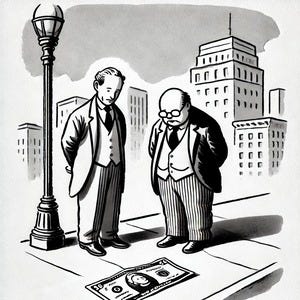The Black Swan
There’s an old joke about two economists walking down the street. They come across a $20 bill lying on the sidewalk.
Economist A: “Look! There’s a $20 bill!”
Economist B: “It can’t be. Someone would have picked it up.”
It’s a good joke because it makes fun of the assumption of the rational economic man: someone who considers all relevant information to make unbiased, correct decisions to maximize their personal utility. They include their expectations about the future. They adjust their expectations as new information comes into view. Add the assumption that everyone is the same and it becomes easier to build tractable models.
In a world of rational economic men, it would be impossible to imagine a $20 bill laying out in plain view. In practice, there are plenty of reasons why we might see one on the street. Maybe someone just dropped it. Perhaps people didn’t see it. Everyone is on their phones.
The subtext of the joke is biting. Life is more complicated than economic theory. It’s funny because it’s true.
Bureaucracy is a cousin of rational economic man. Its theoretical underpinning presumes that the planner and the regulator have constant, complete, and perfect information they use to make unbiased, logical decisions that optimize social utility. This could be the interest of the corporation, say when corporate HR issues a policy about returning to the office after the Pandemic. Or it could be a government agency that updates emissions standards for power plants. These agents act on a set of information for the general good.
What could be more different from rational, command thinking than the entrepreneurial approach? I like Taleb’s comment from his book, The Black Swan.
“The strategy for the discoverers and entrepreneurs is to rely less on top-down planning and focus on maximum tinkering and recognizing opportunities when they present themselves. So I disagree with the followers of Marx and those of Adam Smith: the reason free markets work is because they allow people to be lucky, thanks to aggressive trial and error, not by giving rewards or ‘incentives’ for skill. The strategy is, then, to tinker as much as possible and try to collect as many Black Swan opportunities as you can.”
Think of any great discovery. The outcome was uncertain. There may have been significant costs to pursuing it. Its hypothesis would need to overcome the doubt that the herd would impose.
Bureaucracy lives in the conventional wisdom, the safety of the known.
One popular theory of Steve Jobs’ success is that he would give people what they wanted before they knew it. I think of it differently. Jobs identified and solved a problem that people had but of which they were unaware. Or if they were aware of it, they discounted the possibility of its resolution so much that they ignored it.
For example, let’s look at what he did with music. The problem he identified was simple. How could people walk around with a legal library of thousands of easily accessible songs on a device that was small enough and sexy enough they’d want to take it everywhere they went?
When he came up with the idea, there were portable MP3 players that could replace a portable cassette players like a Walkman. All they did was to swap out the technology. You still had roughly the same number of songs on the device. To be generous, let’s say you had an order of magnitude increase in the number of songs you could carry from 30 to 300. You would “rip” the songs from a CD using software so that you could use them on your device. Of course, this meant that you could now share those files with anyone else. Anxiety in the music industry was high.
Jobs combined form and function, with his engineers tinkering with the technology to permit scale and to inhibit file sharing, while setting up a way for people to purchase digital files, skipping the laborious ripping process, confident that people would be happy to pay for content.
When he did it, nobody could imagine a world in which this was commonplace. Jobs had to tell a story. He was a brilliant story man.
Once upon a time, we used to walk around with big chunky boxes that carried several hundred bootleg digital song files. Every day, we would rip a few more songs from our CDs, or as likely, go to an illegal file sharing site and download some songs, patiently load them onto our device’s limited memory, and then run or walk or do whatever while carrying these bricks in our pockets or clipped to our belts. Until one day, Apple released the iPod: a smaller, beautiful device that permitted carrying many more songs all of which were paid for so artists could be compensated fairly for their work. Also, having an iPod signaled our status as being part of the in-crowd. Because of that, there was a revolution in the music industry with an increase in sales and musicians began to make significant money again. Because of that, Apple realized they could add other features to the iPod until eventually they made a mobile phone that incorporated the iPod’s functionality but also many other features, revolutionizing the way we consume digital content and interact with one another. Until finally, everyone carries a mobile phone, either from Apple or one of its competitors, with the capabilities of a full computer, something that can exploit the explosion of cellular bandwidth.
The Soviet Union would never have developed an iPhone. They would have waited for it to emerge on the scene. Then they would have tried to copy it. Or steal it.
The bureaucracy exists in the here-and-now. They are in the belly of the probability distribution. They want to keep the trains running on time. The entrepreneur and the dreamer live in the fat tails. They are looking for the outliers that will move things one way or the other.
The bureaucracy solves the original problem set, constrained by the original conditions. Imagine a factory that produces widgets. They manufacture one thousand widgets a day, using an industrial plant with a complicated configuration. All of their peers use a similar set-up. People understand that this is the way you make widgets.
Until one day an entrepreneur suggests to them that they have a problem. The way in which they produce widgets and think about widget production is inhibiting them from making two thousand widgets a day with the same plant. Some slight changes to its configuration could double output.
On the face of it, the manufacturer doesn’t have a problem. They’re making their quota of widgets. The factory is rated for one thousand widgets a day. Everyone knows making widgets is hard work.
But they do have a problem, one that becomes real the moment the salesman opens his mouth. He tells them that he can re-rate their plant’s capacity. Maybe he can. Maybe he can’t. But now, it’s out there.
The rational thing to do is to investigate the entrepreneur’s claims. But the people in the plant are busy, keeping the machine running. The irony is that they would be less busy if the entrepreneur is correct and they install his solution. We do need the widgets after all. It’s an open question as to whether management tests the entrepreneur’s theory. They may decide to bury the idea because it makes them look bad. If they could have doubled output a year ago, they left widgets on the table. Widgets are money.
Some people will proceed with the test. Others won’t.
There is a tension between bureaucracy and discovery, between exploitation and exploration. Organizations need to strike a balance between the two forces to obtain the social optimum. It’s not just the entrepreneur that gets lucky. If she can create value, we all benefit. But we still need to eat. We only have so many resources. Too much regulation and we do not grow. We may even fall back as the existing machine fails to adapt to changing conditions. Too little regulation and we squander our time and energy on projects with diminishing prospects at the cost of consumption today. We need both the manager and the dreamer, the MBA and the inventor. Occasionally, in an organization or in a society, we become imbalanced, too skewed to one side of the boat. A healthy society self-corrects.
Are we on the cusp of such a move?




